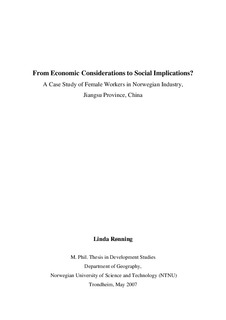| dc.contributor.author | Rønning, Linda | nb_NO |
| dc.date.accessioned | 2014-12-19T14:25:28Z | |
| dc.date.available | 2014-12-19T14:25:28Z | |
| dc.date.created | 2007-06-11 | nb_NO |
| dc.date.issued | 2007 | nb_NO |
| dc.identifier | 122399 | nb_NO |
| dc.identifier.uri | http://hdl.handle.net/11250/265205 | |
| dc.description.abstract | An increasing number of companies are relocating from developed to developing countries. The recent years, China has emerged as one the largest recipients of foreign direct investment in the world. The reason for the relocation is mainly to save costs on production, where labour is one of the main factors. Many of these workers are female and much literature has focused on bad working conditions and exploitation. Through a case-study of some female blue- and white-collar workers in a Norwegian company in a rural town in Jiangsu province, China, this study seeks to find what impact economic globalization has on their lives. Through in-depth interviews, some of the experiences of working in the Norwegian company are tried captured. Key-informants in the company and the local government are also interviewed. The interviews are supplemented with observation and secondary literature to contextualize the answers. The analytical framework is the capability approach, to see if foreign industry can lead to capacitation and potentially empowerment of the female workers. Both material and immaterial achievements are considered. The focus is on the women in the context of the household and the changes the Norwegian company represents compared to the earlier places the women have worked. The industrialization of the area where the women lived meant expanded employment opportunities. Most of the women had worked in different Asian or Chinese companies before and the change to the Norwegian company represented generally a shift to the better in terms of working conditions and wages. This had enhanced their capabilities to a certain degree. Paid employment can potentially give women a stronger bargaining position in the household. The women controlled their income and were responsible for the daily shopping. Larger expenditures were discussed with their husbands and decisions were apparently jointly made. There were no significant changes in the gender division of labour, suggesting that traditional gender roles are resistant to change. Thus, the women were better off in the Norwegian company in terms of wages, working hours and welfare, but their lives in general did not change significantly. There were considerable differences between the white- and blue-collar workers though, indicating the role of education. | nb_NO |
| dc.language | eng | nb_NO |
| dc.publisher | Geografisk institutt | nb_NO |
| dc.subject | Master of Philosophy in Development Studies, specialising in Geography | en_GB |
| dc.title | From Economic Considerations to Social Implications? A Case Study of Female Workers in Norwegian Industry, Jiangsu Province, China | nb_NO |
| dc.type | Master thesis | nb_NO |
| dc.contributor.department | Norges teknisk-naturvitenskapelige universitet, Fakultet for samfunnsvitenskap og teknologiledelse, Geografisk institutt | nb_NO |
